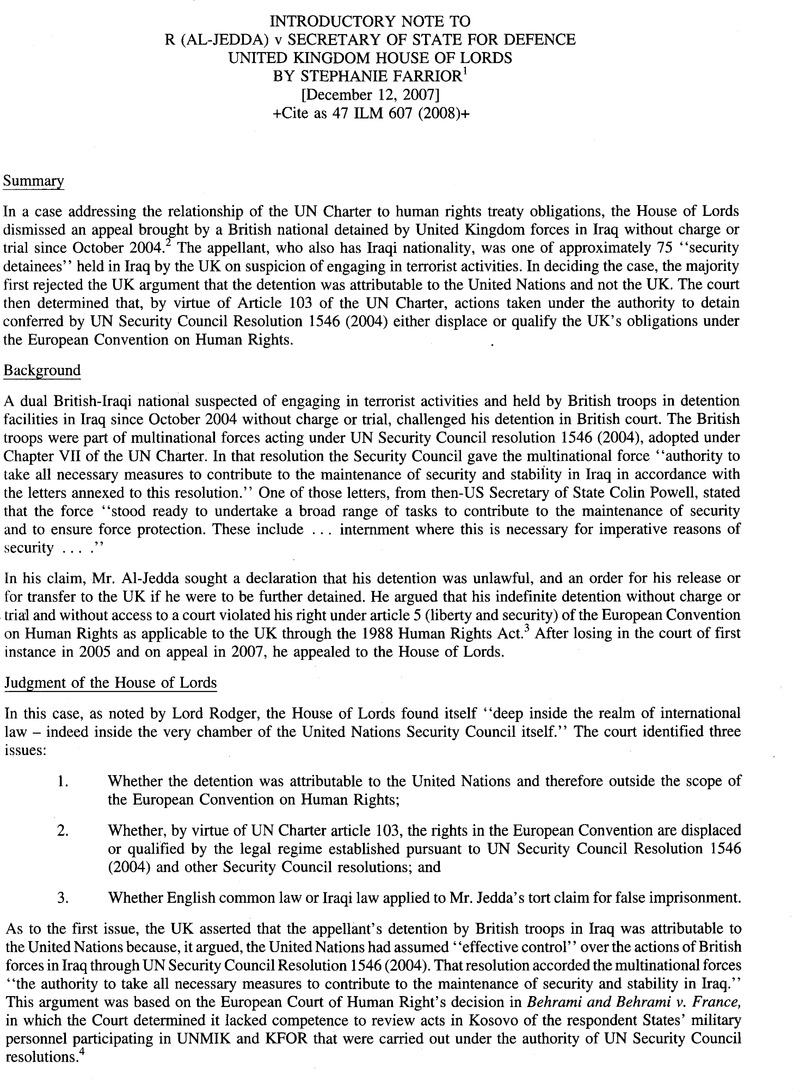Article contents
R (Al-Jedda) v Secretary of State for Defence United Kingdom House of Lords
Published online by Cambridge University Press: 27 February 2017
Abstract

- Type
- International Legal Documents
- Information
- Copyright
- Copyright © American Society of International Law 2008
References
Endnotes
2 R (Al-Jedda) v Secretary of State for Defence, [2007] UKHL 58 (hereinafter Al-Jedda).
3 Article 5(1) of the European Convention on Human Rights provides: Everyone has the right to liberty and security of the person. No one shall be deprived of his liberty save in the following cases and in accordance with a procedure prescribed by law: ….” Lord Bingham wrote that none of the cases allowing a deprivation of liberty was applicable.
4 See Stephanie Farrior, Introductory Note to Behrami and Behrami v France and Samarati v France, Germany & Norway, 46 ILM 743 (2007).
5 Article 103 of the UN Charter provides: In the event of a conflict between the obligations of the Members of the United Nations under the present Charter and their obligations under any other international agreement, their obligations under the present Charter shall prevail.
6 United Nations Charter, article 1: “The purposes of the United Nations are … (3) To achieve international co-operation in … promoting and encouraging respect for human rights and for fundamental freedoms for all …”
7 Lord Bingham quoted that support from the European Court of Human Rights decision in Waite and Kennedy v Germany, (1990) 30 EHRR 261, para 67: The court is of the opinion that where states establish international oganisations in order to pursue or strengthen their co-operation in certain fields of activities, and where they attribute to these organizations certain competences and accord them immunities, there may be implications as to the protection of fundamental rights. It would be incompatible with the purpose and object of the Convention, however, if the contracting states were thereby absolved from their responsibility under the Convention in relation to the field of activity covered by such attribution.”
8 He cited the European Court of Human Rights in Behrami paragraph stating that since Security Council resolutions rely for their effectiveness on support from UN member states, the acts taken pursuant to those resolutions should not be subject to scrutiny for consonance with the European Convention on Human Rights, (para. 36, citing Behrami).
9 R (Al-Skeini) v Secretary of State for Defence (The Redress Trust intervening) [2007] UKHL 26.
10 Case Concerning Questions of Interpretation and Application of the 1971 Montreal Convention Arising From the Aerial Incident at Lockerbie [1992] ICJ Rep 3, para 39; Case Concerning Application of the Convention on the Prevention and Punishment of the Crime of Genocide (Bosnia and Herzegovina v. Serbia and Montenegro) [1993] ICJ Rep 325, per Judge ad hoc Lauterpacht, pp 439-440, paras 99-100.
11 Application of the Genocide Convention, Separate Opinion of Judge Lauterpacht, supra n. 10, para. 101.
12 Id. at para. 102.
- 1
- Cited by


